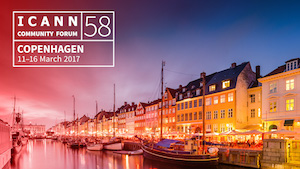Internet governance public session
21 Mar 2017 01:00h
Event report
The Internet Governance Public Session focused on the following topics: the work of ICANN’s Cross Community Working Group on Internet Governance (CCWG-IG); the main Internet governance issues for 2017 and the primary outcomes on the IG front in 2016; and, the IG priorities for the CCWG-IG and ICANN, taking into account the new global political agenda.
The session was moderated by Mr Olivier Crepin-Leblond, Chair of the European At-Large Organisation (EURALO) at ICANN, who, after introducing the items on the agenda, talked about the work that the CCWG-IG has done. The main objective of the CCWG-IG is to coordinate, facilitate, and increase the participation of the ICANN community in discussions and processes pertaining to Internet governance. He talked about the new Charter draft. He said that since it has only recently been submitted, there has so far not been any feedback from the chartering organisations, i.e the Country Code Names Supporting Organization (ccNSO), Generic Names Supporting Organization (GNSO), and At-Large Advisory Committee (ALAC).
Ms Marilyn Cade, Principal and CEO of mCADE, ICT Strategies, highlighted the different aspects of the CCWG-IG work, as well as the importance of continuing to consider emerging issues that could affect ICANN´s mission. She also remarked that the WG is open to new participants, both active members and observers, and she invited those present at the session to join.
Crepin-Leblond continued the discussion with the Charter review process, and provided information on where to find documents such as member lists, previous call records, and next calls and events on the CCWG-IG webpage. He also mentioned the work and efforts of the members to keep the group updated on a variety of issues that are part of the Internet governance ecosystem.
Ambassador Benedicto Fonseca mentioned the WSIS+10 review process and talked about the Working Group on Enhanced Cooperation (WGEC). He reminded the audience that the WGEC comes from the Tunis Agenda, but that there are different interpretations of the concept. However, he stressed that despite the different interpretations, there has been an increase in co-operation on different levels, but that there are still improvements to be made. Regarding the work of the WGEC, he said that the second meeting took place on 26-27 January 2017 in Geneva, and that the third one will be held on 3-5 May 2017 at the same venue. He also remarked that there will be remote participation.
Cade added that the annual WSIS Forum is important for ICANN, as it is a great opportunity for the ICANN Board Members, the CEO, and high-level staff be in contact with the ministries of different countries.
Mr Nigel Hickson, Vice President, Global Stakeholder Engagement at ICANN, spoke about the two International Telecommunication Regulations (ITRs) – one from 1988 and another from 2012 – at the International Telecommunication Union (ITU). He explained that problems arise when a country applies both. In addition, he said that the next World Telecommunication Development Conference (WTDC) will take place from 9 to 20 October 2017 in Buenos Aires.
Mr Jorge Cancio, Senior Legal Adviser to the Swiss Government, talked about the twelfth annual meeting of the Internet Governance Forum (IGF) which will be held in Geneva on 18–21 December 2017, and invited the community to submit workshop proposal for this year’s agenda.
Mr Markus Kummer, ICANN Board member, mentioned that the IGF is funded by voluntary contributions and that ICANN makes contributions to this trust fund. He also said that the IGF is a good place for recruiting new ICANN community members.
For the last topic on the agenda, Ms Tatiana Tropina, Senior Researcher at the Max Planck Institute for Foreign and International Criminal Law, and member of the Executive Committee of the Non Commercial Users Constituency (NCUC), highlighted issues related to Internet governance that are important for ICANN, such as cybersecurity. She stressed that ICANN does not need to get involved in all these matters, but it should be aware of the developments and how they could impact the multistakeholder model. She remarked that the ICANN community have proved that the model works.
Related topics
Related event

